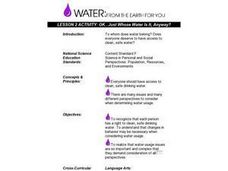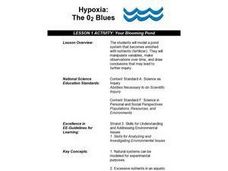Curated OER
Making a Difference in World Health
Students discover environmental awareness by conducting a collection project in class. In this global food activity, students identify the importance of feeding all of the humans on Earth and discuss why some aren't properly nourished....
Curated OER
Will Biotech Crops Solve World Problems?
Students read an online article to examine what biotechnology and agricultural biotechnology are. They answer questions and complete worksheets based on the article's information.
Curated OER
Medical Research and Your Future
Learners are asked to investigate current and sometimes controversial medical research in order to address what medical breakthroughs potentially exist in their futures. They create small posters on sheets detailing their support or...
Curated OER
Deforestation
Students study the effects of deforestation. In this environmental lesson, students view a PowerPoint slideshow about the importance of trees. Students read The Lorax and discuss what the characters represent in our society.
Curated OER
Fighting Soil Erosion
Young scholars complete hands-on activities and watch a video to learn about soil erosion. In this erosion instructional activity, students use hands-on studies to investigate soil erosion. Young scholars then visit the given websites to...
Curated OER
Wonderfully Wild Unit
Young scholars explore the ethics of 'fair' in regards to humans relationship with wildlife. In this wildlife study lesson, students read the story starters about wildlife and then discuss how to finish the story. Young scholars finish...
Curated OER
Getting To Know the Activists Among Us
Pupils discuss what it means to be an "activist." They identify various types of activist organizations and brainstorm the names of local people and organizations that might fit these categories. They research one of these...
Curated OER
OK...Just Whose Water Is It, Anyway?
Students recognize that each person has a right to clean, safe drinking water. They explain that changes in behavior may be necessary when considering water usage. They role play a water rights courtoom dispute.
Curated OER
Your Blooming Pond
Students model a pond system that becomes enriched with nutrients (fertilizer). They manipulate variables, make observations over time, and draw conclusions that may lead to further inquiry. They, in groups, simulate a pond environment.
Curated OER
Why Were the Japanese Interned During World War II?
Seventh graders analyze sources to determine why Japanese-Americans were placed in internment camps during World War II. They discuss the fact that individual rights are sometimes taken by institutions because of fear and paranoia. They...
Curated OER
Photos from the Past
Students observe and interpret historic photographs of water in New Mexico. They record observations, draw inferences, and compare water in New Mexico's past with water today. They create a class book or exhibition of the photographs...
Curated OER
Can I Take Action?
Learners create a solution to a problem related to the environment. They work together to develop the plan and pitch the plan to their class. They discuss the action steps taken in a story they were read.
Curated OER
Mother Earth - Father Sky
Third graders research and write about Cyrus Dillan. They explain one of Dillan's sculptures. Students locate six constellations and two planets. They research and write about the daily life of the Pawnee.
Curated OER
Contaminated Water
Students review and use the steps in the scientific method to complete the experiment. In groups, they research the importance of water to plants and animals in their local area. They examine how water can become contaminated and take...















